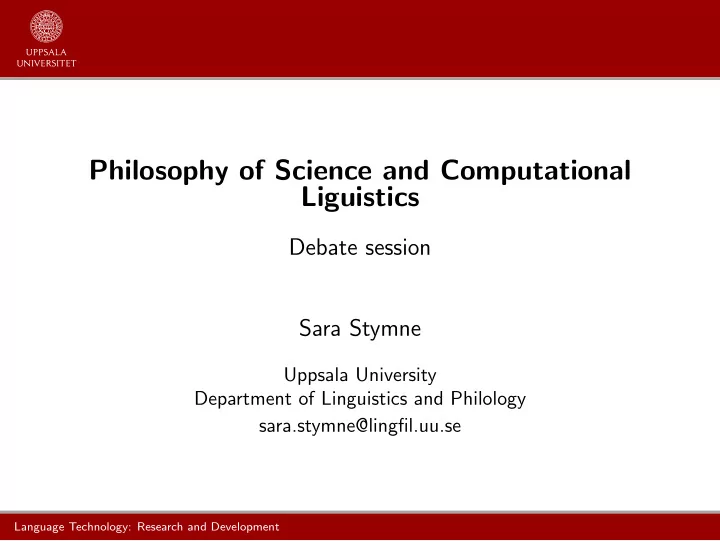

Philosophy of Science and Computational Liguistics Debate session Sara Stymne Uppsala University Department of Linguistics and Philology sara.stymne@lingfil.uu.se Language Technology: Research and Development
Outline for Today ◮ Short introduction and presentation of debate topics ◮ Smaller groups in breakout rooms: Prepare for debate (30–45 minutes) ◮ Debates (15 minutes per topic) ◮ Each group introduces their point of view (1–2 minutes) ◮ Debate among the two groups ◮ Questions and comments from the audience Language Technology: Research and Development
Debate topics ◮ Is language technology a science? ◮ Was their an ”empirical scientific revolution” in the 1990s in Kuhn’s sense? ◮ Is Hume’s problem relevant to language technology? (How? Why?) Language Technology: Research and Development
Language Technology as a Science ◮ Is language technology science or engineering? ◮ Is it a scientific goal to beat the state of the art? ◮ What is the research question/hypothesis? ◮ If science, what is its object of study? ◮ Natural language from a computational point of view (CL) ◮ Computational models applied to natural language (NLP) ◮ Natural language as an example of intelligent behavior (AI) ◮ . . . ◮ If engineering, how is it grounded in science? ◮ Data description from linguistic theory ◮ Theoretical models from mathematics and statistics ◮ Algorithms from computer science ◮ . . . Language Technology: Research and Development
Science ◮ Characteristics of science: (Overton opinion) 1. It is guided by natural law 2. It has to be explanatory by reference to natural law 3. It is testable against the empirical world 4. Its conclusions are tentative, i.e. are not necessarily the final word 5. It is falsifiable Language Technology: Research and Development
Scientific Change ◮ Traditional view: ◮ Science advances in a cumulative fashion ◮ Kuhn’s notion of paradigm (normal science) Thomas Kuhn (1922–1996) ◮ A set of shared theoretical assumptions ◮ A set of accepted problems and methods (“puzzle solving”) ◮ Scientific revolutions ◮ Accumulation of anomalies lead to crisis and revolution ◮ Old paradigm abandoned only if new paradigm available ◮ Copernicus, Darwin, Einstein Language Technology: Research and Development
Language Technology Changes ◮ The “empirical revolution” in language technology ◮ Before 1990: Rationalist approaches and qualitative evaluation ◮ Today: Empirical approaches and quantitative evaluation ◮ What happened? ◮ Paradigm shift in Kuhn’s sense? ◮ Just another swing of the pendulum? ◮ Language technology becoming a mature science? ◮ . . . Language Technology: Research and Development
Hume’s Problem of Induction ◮ Induction presupposes “uniformity of nature” ◮ How can we rationally justify this assumption? ◮ By deduction – safe but impossible David Hume (1711–1776) ◮ By induction – more plausible but circular ◮ Conclusion: ◮ The principle of induction cannot be rationally justified! Language Technology: Research and Development
Debate topics ◮ Is language technology a science? ◮ Group 1: yes ◮ Group 2: no ◮ Was their an ”empirical scientific revolution” in the 1990s in Kuhn’s sense? ◮ Group 3: yes ◮ Group 4: no ◮ Is Hume’s problem relevant to language technology? ◮ Group 5: yes (how?) ◮ Group 6: no (why?) Language Technology: Research and Development
Coming up ◮ First literature seminar, Monday Sep 14 ◮ On Zoom for all groups ◮ Check on the web page if you will present an article at the first seminar ◮ All students read all articles ◮ Take home exam ◮ Handed out: September 9 (morning) in Studentportalen ◮ Hand in: September 17, 23.59 in Studentportalen ◮ Anonymous Language Technology: Research and Development
Recommend
More recommend